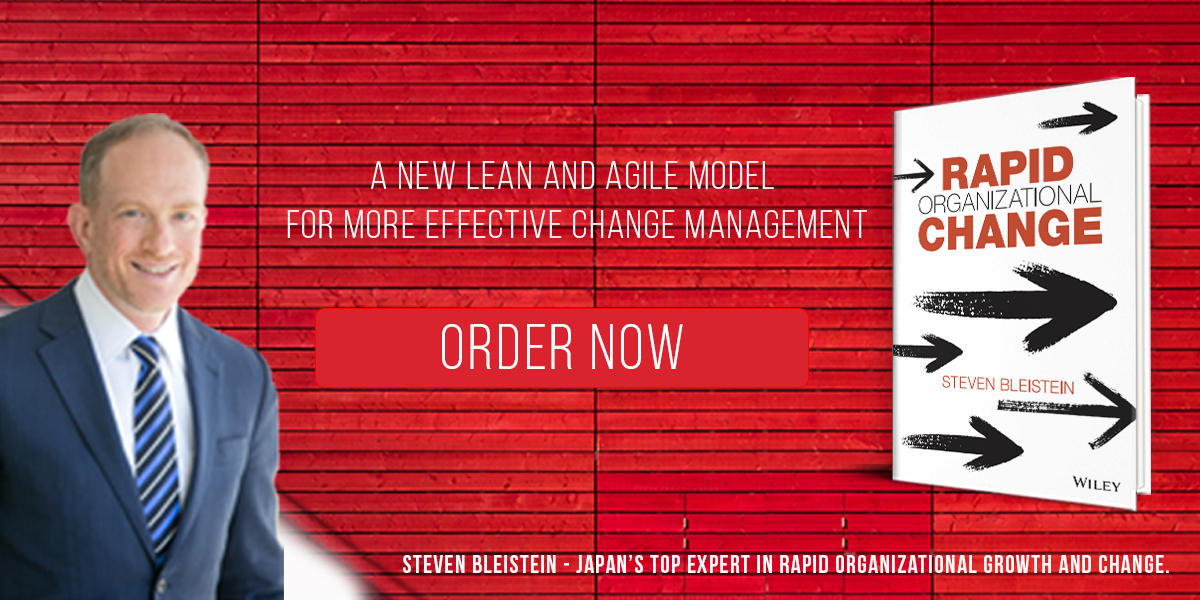[:en]
The Japanese government has lately been working in partnership with industry more than usual to promote white collar work reform to address perennial issues of low productivity, habitual overtime, and health issues related to overwork including death from overwork, known as karoshi. Reforms under discussion address mostly policy around regulating how people work and are paid, such as overtime limits and remuneration. However, these fail to address underlying cause, which is not about how people work, but rather is how managers with staff lead, or rather fail to lead.
White collar reform is not a labor policy issue for government. Share on X
It is a leadership capability deficit issue for companies.
When I observe low productivity in a company and excessive overtime, these are nearly always accompanied by certain practices of mid-level managers. Some of these include the following:
- Vague strategy and objectives for their staff. For example, a sales manager may simply set a sales quota, rather than being specific about which kind of customers to target with what products, which to avoid, and who in the company should be you counterpart and who should not.
- Failure to hold staff accountable for achievement of specific goals, or adhering to specific behaviors. This is of course natural when the strategy is vague.
- There is process orientation rather than goal orientation. For example, a manager says about a staff person, “He doesn’t get results but makes a real sincere effort!”
- Excessive meetings for things like reporting and information exchange. The number one complaint I hear from managers and staff alike around low productivity is too many meetings that go on for too long and accomplish little. The only reason to hold a meeting is to make decisions. All others are superfluous.
- There is excessive fear of failure, or a blame culture inside the company that causes people to be tentative. High productivity comes from rapid action, rapid failure, and rapid learning.
- People are promoted into management positions based on seniority rather than leadership and management capability. They are given little support like mentoring and coaching, and expected gain capability from leadership training seminars, if offered at all, which are the least effective way to develop leaders.
- There are no document processes or principles of work, or they exist but no one follows them. Instead, everything is expected to be learned on the job from one’s seniors. If the person before you did not know what he was doing, no one after him or her will, and there is no basis for continuous improvement.
- Refusing to fire managers who simply don’t work out. This is often due to a practice of lifetime employment. Known as madogiwazoku, these managers are given limited responsibility to be kept busy. In the worst cases, sometimes they are given staff, poisoning more junior people in the company. This kind of deadwood takes up company resources, weighs down other staff, and prevents new blood that may be more productive from coming into the company.
- Tacitly endorsing overtime by staying late.
- Creating financial dependency on overtime with unchecked overtime pay.

These are just some of the more common phenomena I have observed associated with low-productivity, overtime, and overwork. All of these are a result of deficits mid-level management and leadership capability. None of these phenomena can be corrected by changing policy or regulation around overtime and overtime pay, or any other labor-related policy. The only way to address these issues is by strengthening leadership and management capability of managers who have staff. Below are a few ways mid-level leaders can up their game and improve productivity for the organization they lead.
- Set clear strategy, strategic objectives, specific tactics, measures of progress, and targets that indicate success. Review these regularly with staff in a scheduled, formal process.
- Hold staff accountable both for specific behaviors, such as staff must identify an economic buyer before submitting a proposal, as well as results. Follow up on actions decided or promises made during a previous meeting when meeting with staff.
- End “Gambarimasu!” acceptance culture, or what might be translated as, “I’ll try my best!” Seek commitment. As Yoda said, “There is no try. Only do or do not.”
- Treat failure as learning, not something to be avoided or punished for. If people fear failure, they will never try anything remotely risky. However, business success requires trying new things that will often fail. Show me someone who never fails and I’ll show you someone who never learns. Institute an award for the best idea that didn’t work. Encourage the behavior of taking on reasonable risk, not just rewarding the result.
- Eliminate all meetings during which there is no decision to be made. Insist that the decision to be made is explicit and agenda are stated in advance when meetings are called. Let staff know that attendance of any meetings without these is not required. Information exchange is not a purpose for a general meeting unless there is a decision to be made. Staff reporting is not a purpose for a general meeting. Reporting should be done separately by other means. Meetings are used to resolve specific issues and leverage collective experience and wisdom of the group.
- Provide coaching and mentoring for all managers with staff. Coaches may be internal or external. I recommend a combination of both.
- Document process, methods and techniques. Use these as a baseline for improvement, a standard against which to evaluate performance, and basis for educating new staff. Review and modify the process regularly to keep it fresh and useful. I recommend yearly.
- Fire managers who simply don’t work out. If you have tried by providing support and there is no other work in the business to which the manager might be suited, let him or her go. Do it humanely with a reasonable severance package. After all, the company is partly to blame for having hired the wrong person in the first place.
- Go home early. Tell your staff to go home. Accompany them out the door.
- Reward people financially for results, not for time put in.
All of the above suggestions are things that any manager in any company can do now, and get immediate results. There is no need to wait for the government to act. If you are leading a large organization with multiple layers of management below you, you must start with the team that reports to you. Once they have reformed, you can coach them into doing the same with the teams below them, so on and so forth. Much low productivity is a leadership issue, not a work issue. As a leader, you can resolve it.
ここのところ日本政府には、能率の悪さ、慢性的な残業、いわゆる「過労死」などといったものも含む働きすぎによる健康被害といった、オフィスワークにおいてよく見られる問題の改善に、業界と協力しあって取り組む、といった動きが見られます。議論されている改善内容というのは、主に人々の働き方や給与の支払われ方(例えば残業時間の制限や報酬について)に関するものです。しかしながら、これでは問題の根本的な部分に対処しているとは言えません。問題なのは人がどのように働いているかではなく、部下のいるマネージャーがしっかり指導をしていない、という点なのです。つまり、オフィスワークの改善とは、政府による労働法の改訂がもたらすものではなく、企業内のリーダーシップ能力不足を解決してこそ起こるものと言えます。
企業内での能率の悪さや過剰な残業を目の当たりにする時、その大体の場合は中間管理職のある種のやり方が原因となっていることがわかります。例えば、
- 部下に示す戦略や目的があやふやである。例えば、営業部長からの指示。どの商品を売るのにどのような顧客を対象にするか、どのような点に気をつけるか、取引先のどの人と話をするべきか(もしくはどの人は避けるべきか)、といった具体的な指示を出す代わりに、単に営業ノルマのみを課すような上司の場合。
- スタッフに決まった目標の達成や一定の行動基準を守る責任を負わせることをしない。戦略がクリアでない場合によく起こるケースである。
- 目標よりプロセスに重きを置いている。マネージャーが部下について、「彼は結果は出していないが、よく頑張っている。」などというのがこの例である。
- 報告や情報の交換のための無駄なミーティングが多い。私が管理職、スタッフの両方から一番よく聞く能率の悪さに関する悩みは、ミーティングの多さ、長さ、効率の悪さである。ミーティングとは、何か決断を下すためのみに行われるべきものだ。それ以外の目的のミーティングなど、無駄である。
- 失敗することに対する恐れが大きかったり、社内で失敗をすぐに責めるきらいがあると、社員も何をやるにもためらいがちになってしまう。能率の良さは迅速な行動、迅速な失敗、そして迅速な学習からこそ生まれるものである。
- リーダーシップや管理能力ではなく、年功序列により昇進が決まる。彼らはメンタリングやコーチングといったサポートを殆ど与えられることなく、実は大変効果の低いリーダーシップトレーニングセミナーのようなものだけ受けて(あるいはそういう機会さえ与えられないまま)リーダー能力を養うことを期待されている。
- 仕事を行う上でのプロセスや指針が文書化されていない、あるいは文書化されているにも関わらず、誰もそれを使っていない。代わりに、社員は仕事をこなしながら上司から色々学ぶものと考えられている。故に、もし自分のやっていることがわかっていないような上司から学んだとすれば、その部下もちゃんとしたやり方を学べるわけはなく、継続的な改善などできるわけはないのである。
- 仕事に合っていないマネージャーの解雇を拒む。終身雇用制のせいでよく見られる例である。いわゆる窓際族と呼ばれるこういったマネージャーたちは、単に忙しくしてもらうため、という理由から、大したことのない仕事のみを任される。ひどいケースだと、部下もつけられ、その部下にも悪影響を及ぼすことになる。こういった窓際族たちは企業の資源を無駄遣いし、他の社員に迷惑をかけ、もっと効率の良い新しい社員が入ってくることの妨げとなる。
- 暗に残業を推奨する。
- 残業代のチェックをせずに、残業代への依存を生み出す。
上記事項は、私が悪効率、残業、過労が問題となっている企業を観察した際、しばしば共通して見られた状況です。そしてそれらは全て中間管理層、リーダーシップにおける問題に起因したものです。ですからいくら残業や残業手当、またそれ以外の勤労条件についての規則や法律を変えても、このような問題がなくなるとは思われません。この状況を改善する唯一の方法は、部下を持つマネージャーのリーダーシップや管理能力を強化することです。中間レベルのリーダーの方々がその能力を上げ、自社の能率を向上する為にできるようになる方法には、このようなものがあります。
- 明確な戦略、戦略目的、具体的な実行方法、推進状況の測定方法、成功と見なす目標を作成する。これらは定期的にきちんとスタッフと共に見直すこと。
- 決まったやり方に従い(例:提案書を提出する前にエコノミックバイヤーを特定しておく、など)、結果を出すことについて、スタッフに責任を持たせる。ミーティングでは、前回のミーティング時に決めたことや約束事をちゃんと守り、行動に移しているかを確認する。
- 「頑張ります」とか「精一杯やります」と言えば許されるような雰囲気を無くす。ヨーダの言葉を借りれば、「やってみる、じゃない。やるか、やらないかだ。」
- 失敗は学びの機会であり、避けたりその為に罰を受けたりするためのものではない。失敗を恐れる人は、ちょっとでもリスクを伴うものに挑戦しようとはしない。しかし、ビジネス上の成功には、新しいことへの挑戦は不可欠であり、それはしばしば失敗に終わるものでもある。失敗しない人とは、学ぶことのできない人なのだ。実現できなかった最高のアイディアに賞を授与するなど、どうだろう。結果のみを評価するのではなく、妥当なリスクを進んで取ることも評価してあげたいものだ。
- 決定事項がないようなミーティングは行わない。またミーティングを行うのであれば、必ず明確な決定事項があり、前もって会議議題も明らかにしておくこと。これらの条件を満たさない会議に出席する必要がないことをスタッフにも伝えておこう。決定事項のない情報交換だけのミーティングなど一般会議とは呼べない。また、スタッフからの報告も一般会議の目的とは言えない。報告が必要であれば、別の方法で会議外で行うべきである。会議とはグループが経験、知恵を集めて特定の問題を解決する場なのだから。
- 部下のいるマネージャーには、コーチングとメンタリングを供給する。コーチは企業内外のどちらから探しても良いが、私は個人的には両方を勧める。
- プロセス、やり方、技法などを文書化する。そしてこれを元に改善、業績の評価、新社員の教育を行う。プロセスは定期的に見直し、改訂を行い、常に使えるものにしておく。私は年に一度の見直しを推奨している。
- 仕事に向いていないマネージャーは解雇する。サポートすることもやってみたし、社内に他に向いた仕事がない、というのであれば、辞めてもらうべきである。その際には妥当な離職手当を出し、人道的なやり方で行おう。大体元はと言えば、あっていない人を採用したのは、会社のせいなのだから。
- 定時には帰宅し、部下にもそうしてもらう。ドアまで一緒に行くのもいいかもしれない。
- 良い結果を出した社員には金銭的な報酬を与える。(あくまでも結果に対する報酬であり、働いだ時間に対するものではない。)
上記の提案事項は、どの企業のどのマネージャーでもすぐに実践できることであり、また即座に結果が出せることでもあります。政府が色々やろうとしていることをじっと待っている必要などありません。あなたが下に何層もの管理職レベルがあるような大企業を経営しているのであれば、まず、自分の直属のチームから始めてください。そのレベルでの改革が行われば、彼らにそのやり方を教えることで、その下のレベル、またさらに下のレベルへと改革を浸透させて行くことができるのです。もう一度言います。程能率問題の殆どは、仕事そのものに原因があるのではなく、リーダーシップに起因するものです。そしてリーダーであるあなたは、その問題を解決する力を持っている筈です。[:]



